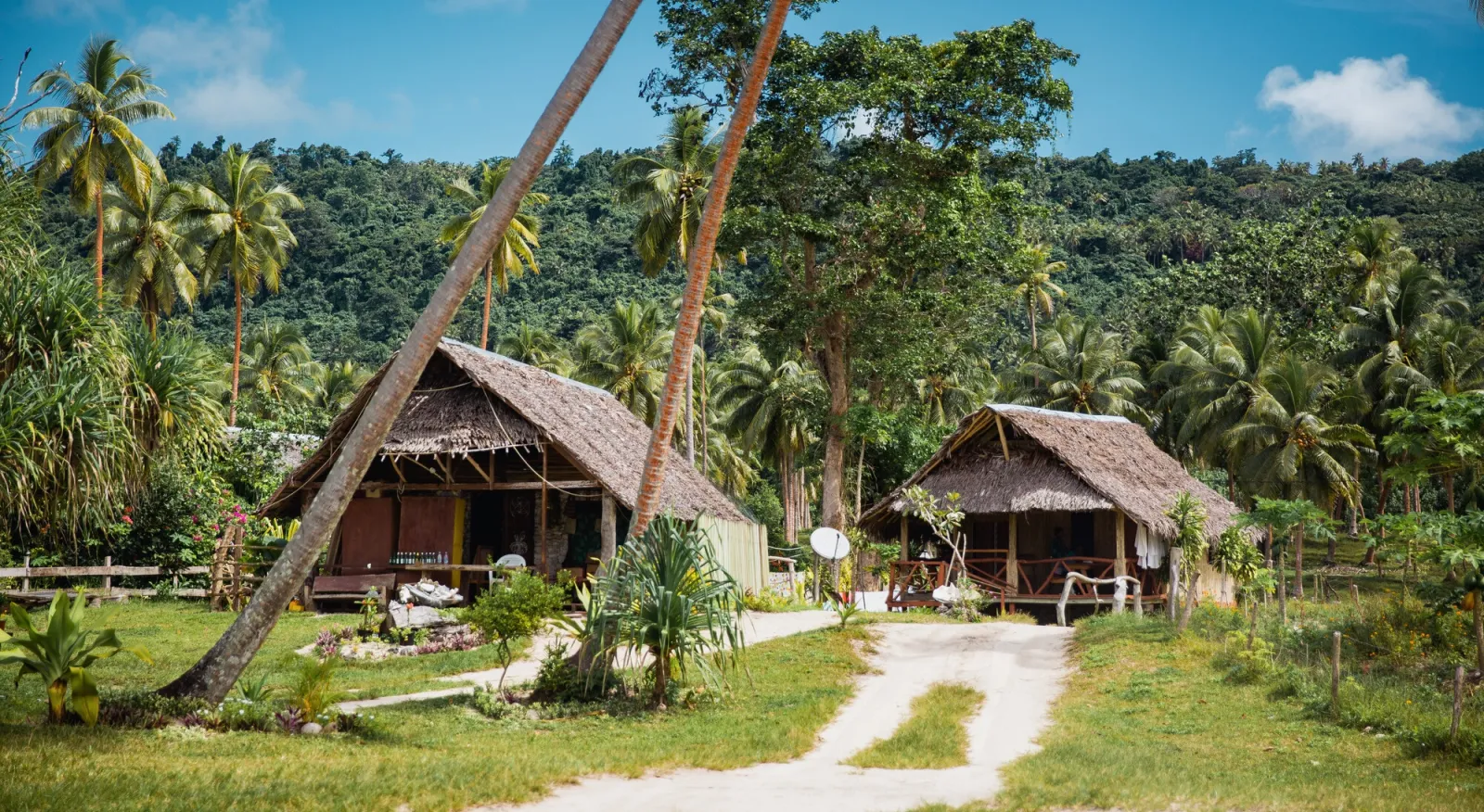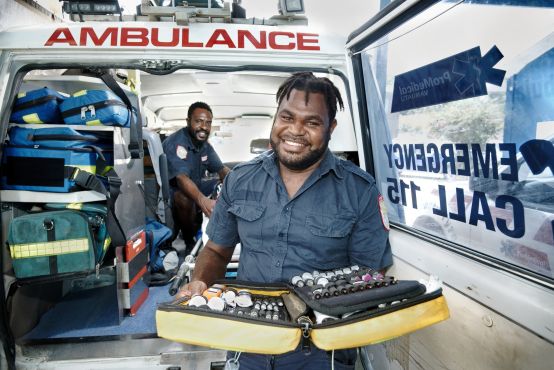
About Vanuatu
Vanuatu is a Y-shaped archipelago consisting of 83 islands in the South Pacific region, lying between Solomon Islands and Fiji. Vanuatu is administratively divided into six provinces, with approximately three quarters of its population living in rural areas.
Port Vila is the capital and largest city of Vanuatu with a population of about 60,000. Located on the south coast of Efate Island in Shefa Province, Port Vila is the commercial and administrative centre of Vanuatu. The country’s economy is based on small-scale agriculture, fishing, offshore financial services and tourism. Agriculture provides a living for about two-thirds of the population.
The islands of Vanuatu were inhabited by Melanesian peoples for thousands of years before European contact. In the late 19th century both France and Britain claimed parts of the archipelago. Vanuatu gained political independence in 1980. Built around a harbour and two lagoons, Port Vila is well known for its stunning scenery.
The nation's economic development is vulnerable, as the region is often affected by unpredictable weather events. In 2015, Cyclone Pam severely damaged 90 per cent of buildings in Vanuatu.
Australian volunteers have supported a wide range of partner organisations in Vanuatu to achieve their development goals since 1966.
Learn more about the Australian Volunteer Program's work in Vanuatu.
Key things to consider about volunteering in Vanuatu
- Cyclones are common in Vanuatu: they can be mild or cause major destruction. Volunteers must be prepared and follow instructions from in-country staff and authorities to ensure their safety.
- Men and women tend to socialise within same-sex groups, and only occasionally will you find that women and men socialise together. Having a lone male or female visit you in your home alone may be misunderstood.
- Dress code: Vanuatu is a conservative place, and some western-style clothing is not appropriate. Loose-fitting, light, cotton clothing is best for the climate and culturally appropriate.
- Vanuatu time: Approaches to time and timing are different to that in Australia. Service delivery and the pace of office life is likely to be slower than what you are used to in Australia.
- Range of activities: Vanuatu offers a range of activities from snorkelling, hiking to relaxing beach days. Connect with your colleagues for the best local spots and experiences on the island.
Strengthening capacity with small grants
Australian volunteer Peta Owen and her colleagues at ProMedical Vanuatu received a small grant from the Australian Volunteer program to strengthen capacity with on-the-job training with Ambulance Victoria in Melbourne.

Culture and religion
Understanding culture is an important part of integrating into the community in Vanuatu. Culture and tradition are very important to the people of Vanuatu. Establishing respectful relationships is fundamental to volunteers’ effective integration into the community.
Art, storytelling, and music play a vital part in sharing Vanuatu’s culture. Volunteers can experience this across all the islands, from body decorations and tattoos to hand carvings, costumes and headwear.
Aspects of culture in Vanuatu may seem to favour men over women. This comes from the belief that women’s and children’s safety is in the hands of the husband and fathers.
Religion
Christianity is the largest religion in Vanuatu. Protestant Christians account for about 70% of the population of the country. 12.4% of the population practice Catholicism.
Most Ni-Vanuatu are religious and attend church on a weekly basis. Meetings, workshops, and sports sessions commonly begin and end with a prayer.
Many Ni-Vanuatu people go to church on Sunday, or Saturday for Seventh Day Adventists. Going to church is a good way of meeting people and integrating into the community culture. There is usually a collection for the church and any amount of money can be given.
Dress
Casual, modest, loose clothing is usually acceptable in the workplace and in public. Neat, conservative clothing should be worn for formal occasions.
The most appropriate dress for women is skirts and modest shirts. Skirts must be below the knee in villages. For church, women wear an island dress or a skirt and blouse. Men can wear shorts or pants and a shirt with sleeves. When swimming they can wear shorts or pants, and a shirt.
Language
The official languages are Bislama, French and English. Bislama is most commonly spoken outside Port Vila.
Around 110 indigenous languages are still spoken by an average of only 2,000 people per language, making it the country with the highest density of languages per capita in the world.
The program provides funding to support language lessons. More information on this process will be available during the onboarding process.
Explore our Pride Guides
LGBTQIA+ program participants must be aware of the country's context before undertaking an assignment. Pride Guides are designed to introduce key issues related to people with diverse SOGISEC & their participation in the program.
Learn more
Day to Day Life
Climate
The climate is influenced by the trade winds. Vanuatu is equatorial on the northern islands - hot and rainy year-round. In the central and southern islands, the climate is tropical, with a hot and rainy season from December to March and a cool and drier season from May to October.
Vanuatu is one of the most natural disaster-prone countries in the world. It experiences several cyclones each year, mostly between November and April. Vanuatu has seven active volcanos and tremors and earthquakes are frequent.
Telecommunications
Most of Vanuatu is covered with telecommunication connections. Internet in Vanuatu tends to be slower than in Australia, particularly in remote areas where it is known for dropping in and out of reception.
Food and dining
Supermarkets and restaurants are available in many locations, as well as vegetable markets where you can enjoy fresh foods.
In Port Vila supermarkets stock gluten-free food and non-dairy milk alternatives.
Staple food on the islands includes mostly root crops such as yam, taro and manioc. Seasonal fruits like breadfruit are also important mainstays.
Kava, a derivative of the pepper tree family, is a significant part of Vanuatu culture. Traditionally, it is cut and chewed into a pulp, then spat into a bowl. The mushy pulp is then squeezed into a liquid that is drunk by both men and women as an evening soporific after a hard day’s work.
Accommodation
Volunteers can find a range of accommodation types in Vanuatu, including houses and apartments. Accommodation will vary between the capital and provincial towns. It is common for housing to come furnished or semi-furnished. Rainfall is the principal source of water supply for some volunteer accommodation.
It is a good idea to research where your partner organisation is located before researching your accommodation. Consider your mode of transportation with the location you are looking for.
Find out more about in-country allowances.
Transport
Walking, taxis and buses - in the form of mini vans - are the most common modes of transport. If you do use a taxi, always agree on a price beforehand. Bicycles are not recommended in most areas. Quad bikes, scooters and motor bikes are common forms of transport.
Personal safety
Vanuatu is in a high-impact zone for tropical cyclones, with the area receiving an average of two-to-three cyclones per season. It is important that you are familiar with cyclone terminology and the information tools used to communicate information about storms.
Earthquakes occur frequently in Vanuatu, as the country lies above a tectonic plate boundary. Earthquakes occasionally cause damage to infrastructure but rarely result in serious injury or death. After an earthquake, there may be the risk of aftershocks and tsunami.
While incidents are rare, women travellers and foreign residents (including program participants) have been subject to sexual harassment and sexual assault in Vanuatu. Program participants (women and girls) may experience opportunistic stalking, unwanted opportunistic attention and verbal sexual harassment, particularly when walking alone.
There are a few key health considerations to keep in mind as well. Port Vila is home to a modern public hospital and several private medical centres and clinics. Malaria is not common in Port Vila, but there is increasing incidence of it in rural areas. It is advisable to use a mosquito net and repellent when travelling into rural locations.
Open wounds can quickly flare up, so it is good to cover any cuts and take antibiotics, if recommended by a doctor.
Personal safety issues constantly evolve, we recommend you keep an eye on Smart Traveller for current information.
Mobility and accessibility
We are committed to ensuring that international volunteering is inclusive and accessible to Australians from a range of backgrounds, with diverse perspectives, identities and abilities.
To support this, Access and Inclusion Plans are available for volunteers with disabilities to assess their needs and ensure their living and working requirements are fully considered. Indigenous Pathways is an Indigenous-led program that focuses on providing culturally safe, flexible and tailored support for Aboriginal and Torres Strait Islander volunteers.
Before applying for a volunteering assignment in Vanuatu, please do some further research on living in Vanuatu and the organisation you are hoping to volunteer with. Successful applicants will have the opportunity to discuss expected living and working arrangements with their recruitment officer.